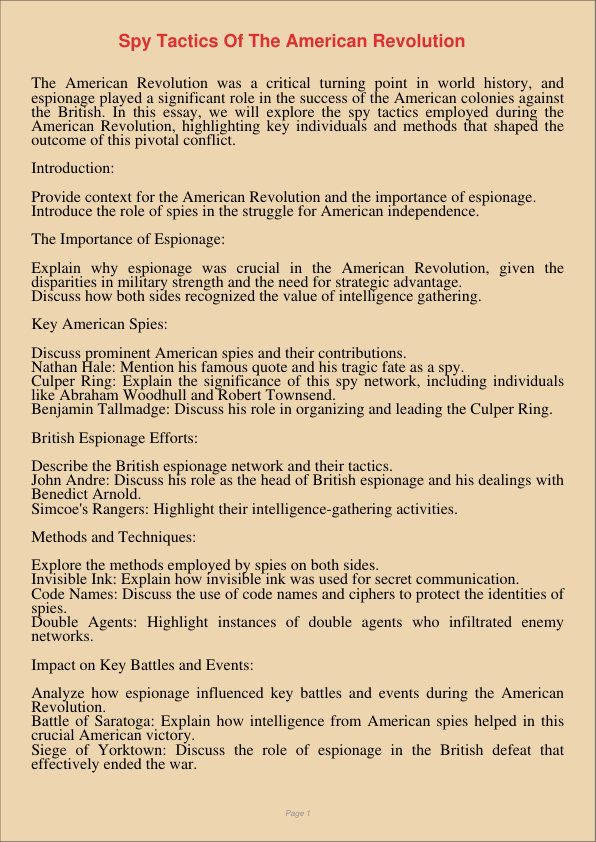Spy Tactics Of The American Revolution
Jan 12, 2024
spy tactics
american revolution
Geography
History

The American Revolution was a critical turning point in world history, and espionage played a significant role in the success of the American colonies against the British. In this essay, we will explore the spy tactics employed during the American Revolution, highlighting key individuals and methods that shaped the outcome of this pivotal conflict.
Introduction:
Provide context for the American Revolution and the importance of espionage. Introduce the role of spies in the struggle for American independence.
The Importance of Espionage:
Explain why espionage was crucial in the American Revolution, given the disparities in military strength and the need for strategic advantage. Discuss how both sides recognized the value of intelligence gathering.
Key American Spies:
Discuss prominent American spies and their contributions. Nathan Hale: Mention his famous quote and his tragic fate as a spy. Culper Ring: Explain the significance of this spy network, including individuals like Abraham Woodhull and Robert Townsend. Benjamin Tallmadge: Discuss his role in organizing and leading the Culper Ring.
British Espionage Efforts:
Describe the British espionage network and their tactics. John Andre: Discuss his role as the head of British espionage and his dealings with Benedict Arnold. Simcoe’s Rangers: Highlight their intelligence-gathering activities.
Methods and Techniques:
Explore the methods employed by spies on both sides. Invisible Ink: Explain how invisible ink was used for secret communication. Code Names: Discuss the use of code names and ciphers to protect the identities of spies. Double Agents: Highlight instances of double agents who infiltrated enemy networks.
Impact on Key Battles and Events:
Analyze how espionage influenced key battles and events during the American Revolution. Battle of Saratoga: Explain how intelligence from American spies helped in this crucial American victory. Siege of Yorktown: Discuss the role of espionage in the British defeat that effectively ended the war.
Challenges and Risks:
Address the challenges and risks faced by spies, including the threat of capture and execution. Discuss the moral and ethical dilemmas that spies on both sides encountered.
Legacy of American Revolution Espionage:
Reflect on how the lessons learned from espionage during the American Revolution influenced later intelligence operations in American history. Discuss the lasting impact of figures like George Washington, who understood the importance of intelligence gathering.
Conclusion:
Summarize the significance of espionage in the American Revolution and its contribution to the ultimate success of the American colonies. Highlight the bravery and resourcefulness of the individuals involved in intelligence operations on both sides, and their enduring impact on the history of espionage.